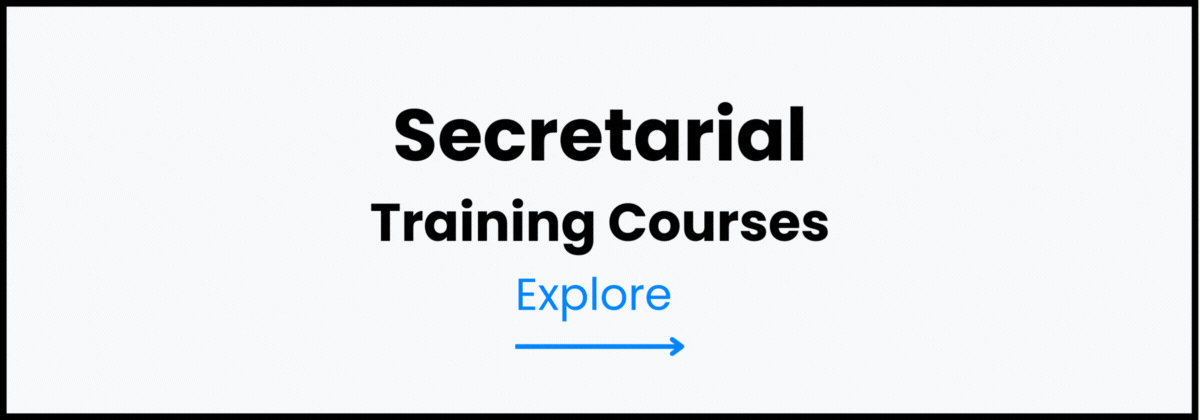10 Duties of a Secretary – What Secretary Job Is?
In the bustling environment of modern offices, secretaries often serve as the unsung heroes who keep everything running smoothly. Secretary’s role is indispensable in supporting business operations, ensuring that everything from communication to coordination flows seamlessly. For those who are curious about the intricacies of a secretary’s job or considering a career in this field, understanding the core responsibilities is key.
What is a Secretary?
A secretary is the backbone of any office, multitasking and managing various responsibilities to ensure efficiency and productivity. They handle a wide range of administrative tasks, from managing schedules and organizing meetings to handling correspondence and preparing reports. Secretaries are often the first point of contact for clients and visitors, serving as the face of the organization. Their skills in communication, organization, and time management play a critical role in the smooth operation of the office. Furthermore, they often take on additional roles such as coordinating events, maintaining records, and implementing office policies, highlighting their versatility and importance within the workplace.
What Secretary Job Is?
A secretary’s function is pivotal, blending a diverse skillset with adaptability to ensure an organization operates seamlessly.
- Key Takeaway: Secretaries are strategic partners who enable executive focus and maintain organizational workflow through proactive problem-solving.
Core Responsibilities & Impact:
- Beyond Administration: Their value extends beyond routine tasks to active involvement in decision-making and problem-solving processes.
- Operational Efficiency: They manage daily logistics and prioritize tasks, freeing executives to concentrate on high-level strategic initiatives.
- Central Communication Hub: They act as the vital communication center within an office, ensuring efficient and discreet handling of all internal and external interactions.
Ultimately, secretaries are indispensable in today’s dynamic business landscape, preventing operational disruption and upholding a professional environment. Explore: Secretarial Training Courses

Duties of a Secretary
-
Managing Schedules and Appointments
A primary and critical duty of a secretary is the expert management of schedules and appointments, a task demanding precision and strategic foresight.
- Key Takeaway: Secretaries act as strategic gatekeepers of time, using organizational tools to prevent conflicts and maximize executive productivity.
Core Aspects of Schedule Management:
- Calendar Orchestration: They organize calendars for executives or entire teams using tools like Outlook or Google Calendar to schedule meetings and plan appointments with precision.
- Proactive Coordination: Their role extends beyond booking to preparing meeting agendas, ensuring all attendees are informed, and confirming critical details in advance to keep everyone aligned.
- Adaptive Problem-Solving: They swiftly rearrange schedules around unforeseen circumstances, leveraging strong interpersonal skills to communicate changes and maintain seamless daily operations.
By mastering this art, secretaries minimize disruptions and directly contribute to the overall productivity and efficiency of the entire organization.
-
Handling Communication
A secretary serves as the vital communication hub for an organization, professionally managing all incoming and outgoing interactions.
- Key Takeaway: Secretaries are the professional first point of contact, ensuring clear, prioritized, and recorded communication to protect executive focus and strengthen business relationships.
Key Communication Responsibilities:
- Primary Contact Point: They act as the bridge between the company and external parties, representing the organization with professionalism and courtesy through phone, email, and other messages.
- Strategic Filtering: A crucial skill is prioritizing messages by relevance, determining which require immediate attention to prevent executive information overload.
- Process Management: Their role includes drafting responses, scheduling follow-ups, and maintaining meticulous records of all correspondence.
By ensuring a streamlined and efficient communication process, secretaries play a crucial role in maintaining strong, successful relationships with clients and partners.
-
Organizing and Maintaining Files
In our information-rich era, a secretary’s ability to organize and maintain files is a critical function that ensures operational efficiency and security.
- Key Takeaway: Secretaries are guardians of information, creating organized, secure, and efficient systems for both digital and physical documents to enable quick access and ensure confidentiality.
Core Filing Responsibilities:
- System Management: They maintain and organize comprehensive digital and physical filing systems for all crucial documents, including contracts, reports, meeting minutes, and correspondence.
- Ensuring Confidentiality: A top priority is handling sensitive documents with discretion, storing them securely, and rigorously restricting access to authorized personnel to prevent data breaches.
- Driving Efficiency: Their meticulous attention to detail in creating order allows for the quick retrieval of information, which saves valuable time and reduces frustration across the organization.
This proficiency is a hallmark of their role, directly maintaining stakeholder trust and safeguarding vital organizational information.
-
Assisting with Office Administration
Office administration involves a diverse array of tasks that are fundamental to maintaining a smooth and productive workplace.
- Key Takeaway: Secretaries are the operational backbone, proactively managing logistics, vendor relations, and maintenance to create a well-equipped and disruption-free work environment.
Key Administrative Duties:
- Logistics & Inventory Management: They order supplies and manage inventory, ensuring the office is always well-equipped for daily tasks and long-term projects.
- Vendor Coordination: They work closely with vendors to guarantee timely deliveries and swiftly resolve any issues, preventing operational disruptions.
- Facilities Liaison: They handle office maintenance and repairs by coordinating with facilities management or external contractors to ensure a safe, comfortable, and positive workspace for all employees.
By managing these critical logistical aspects, secretaries maintain high operational efficiency and contribute directly to a well-functioning office.
-
Preparing Documents and Reports
A secretary plays a central role in the creation, refinement, and distribution of critical business documents, ensuring clarity and professionalism.
- Key Takeaway: Secretaries ensure all business documents are professionally crafted, accurate, and delivered on time, directly supporting the organization’s objectives.
Core Document Preparation Duties:
- End-to-End Creation: They handle the entire process of drafting, editing, formatting, and finalizing a wide range of documents, including reports, meeting minutes, and presentations, with meticulous attention to detail.
- Collaborative Accuracy: They work with team members to gather information, verify data, and incorporate feedback, ensuring the final document meets all required standards and accurately reflects organizational goals.
- Distribution & Deadline Management: They are responsible for distributing finalized documents to the relevant parties and effectively prioritizing tasks to guarantee all deadlines are consistently met.
Their ability to manage these multiple tasks efficiently is essential to meeting the high demands of this critical duty.
-
Coordinating Meetings and Events
Coordinating meetings and events is a complex duty that demands exceptional organizational skill and meticulous attention to detail.
- Key Takeaway: Secretaries are master planners who manage every logistical detail from initial planning to post-event follow-up, ensuring meetings are productive and achieve their strategic goals.
Core Coordination Responsibilities:
- End-to-End Logistical Planning: They handle all aspects of event planning, including booking venues, sending invitations, confirming attendee availability, preparing agendas, and providing all necessary materials.
- In-Meeting Facilitation: They often act as facilitators during events, taking detailed notes and helping to keep discussions focused and on track to support strategic decision-making.
- Comprehensive Follow-Up: Their role extends beyond the event to include distributing meeting minutes, coordinating feedback, and organizing evaluations to ensure the organization extracts maximum value.
This comprehensive approach ensures that every meeting or event, from a small team huddle to a large conference, is executed flawlessly and delivers intended outcomes.
-
Managing Travel Arrangements
For organizations with traveling personnel, managing complex travel arrangements is a vital secretarial function that ensures productive and hassle-free business trips.
- Key Takeaway: Secretaries provide end-to-end travel management, meticulously coordinating all logistics from bookings to expenses, allowing executives to focus solely on their travel objectives.
Core Travel Management Duties:
- Comprehensive Booking & Itinerary Planning: They book flights, hotels, and transportation, crafting detailed itineraries designed to minimize disruptions and maximize efficiency during travel.
- Budget-Aligned Coordination: They work with agencies or providers directly to secure the best travel options that align with the organization’s budgetary constraints and executive preferences.
- End-to-End Support: Their responsibility includes pre-travel preparation of documents, schedule coordination, and post-travel handling of expenses and reimbursements.
By accounting for every detail, secretaries play a pivotal role in ensuring business trips are smooth, productive, and entirely focused on achieving strategic goals.
-
Supporting HR Functions
Secretaries frequently provide essential support to human resources, playing a key role in enhancing both employee experience and administrative efficiency.
- Key Takeaway: Secretaries are crucial partners in HR, ensuring smooth onboarding, meticulous record-keeping, and efficient processes that make employees feel supported and valued.
Key HR Support Duties:
- Seamless Onboarding: They assist with orientation programs, prepare onboarding materials, and coordinate across departments to ensure new hires have a seamless and welcoming first-day experience.
- Record & Attendance Management: They help maintain accurate employee records, track attendance, and assist in scheduling important events like performance reviews.
- Process Efficiency: Their organizational skills and attention to detail are applied to various HR tasks, handling basic inquiries and ensuring all processes are executed effectively.
This support is fundamental to maintaining organized, efficient, and positive HR operations within the organization.
-
Ensuring Office Organization and Cleanliness
A secretary often plays a central role in maintaining a tidy, organized, and efficient physical and digital office environment, directly impacting productivity and morale.
- Key Takeaway: Secretaries are stewards of the work environment, optimizing both physical and digital spaces to enhance functionality, professionalism, and overall workplace well-being.
Core Organization Duties:
- Physical Space Management: They oversee office layout and organization, coordinating with facilities or cleaning staff to ensure workspaces, storage, and communal areas are clean, functional, and aesthetically pleasing.
- Digital System Implementation: They improve digital organization by implementing and managing systems for electronic file management, ensuring digital files are as accessible and well-ordered as physical ones.
- Holistic Oversight: Their involvement spans from daily cleanliness to strategic layout improvements, ensuring the entire office environment supports focus and efficiency.
This holistic oversight is crucial for creating a professional atmosphere that promotes both productivity and positive workplace morale.
-
Adapting to Evolving Technology
Secretary’s effectiveness hinges on continuously updating their skills to harness new software and technologies that enhance organizational efficiency.
- Key Takeaway: Secretaries are pivotal drivers of digital adoption, using their continuous learning to streamline processes and foster a tech-savvy, collaborative workplace.
Key Technological Responsibilities:
- Mastering New Tools: They proactively learn and implement efficiency-boosting technologies like CRM systems, cloud-based file sharing, and digital collaboration platforms.
- Process Optimization: By staying informed on technological advancements, they identify opportunities to streamline workflows and significantly enhance overall productivity.
- Knowledge Sharing & Training: They often train and support colleagues in effectively using new systems, strengthening the entire organization’s digital fluency.
This role is instrumental in building a modern, efficient, and adaptable business operation, ensuring the organization remains competitive and agile.
Industry Specific Duties of Secretary
Duties of a Secretary in Business Communication
A secretary specializing in business communication acts as the central nervous system for information flow, ensuring clarity, professionalism, and strategic alignment both internally and externally.
- Key Takeaway: These secretaries are strategic communication hubs, essential for maintaining professional correspondence, ensuring organizational alignment, and handling sensitive information with utmost discretion.
Core Communication-Specific Duties:
- Professional Correspondence Management: Drafting, receiving, and distributing all formal communications, including emails, letters, and memos, on behalf of executives and departments.
- Structured Meeting Coordination: Beyond scheduling, they prepare detailed agendas, circulate materials beforehand, and document minutes to guarantee accurate and actionable follow-ups.
- Strategic Liaison Role: Acting as the critical communication bridge between departments, clients, and stakeholders to prevent misalignment and ensure everyone has the necessary information.
- Internal Information Dissemination: Distributing company-wide updates, policy changes, and critical notices in a timely and structured manner to all employees.
- Confidentiality Assurance: Managing highly sensitive documents—such as financial reports, business strategies, and executive decisions—with the highest level of discretion and security.
- Executive Content Support: Compiling, formatting, and refining reports, presentations, and other professional documents to support executive decision-making.
Through these structured and meticulous processes, secretaries in this role directly strengthen the organization’s professionalism, operational responsiveness, and strategic clarity. View our Business Communication Training Courses
Duties of a Secretary in HR
An HR secretary is a vital administrative partner, ensuring the smooth operation of the department while directly supporting both strategic initiatives and employee well-being.
- Key Takeaway: HR secretaries are crucial to fostering a positive workplace culture through meticulous administrative support, from seamless onboarding to strict compliance, enhancing the entire employee lifecycle.
Core HR-Specific Duties:
- Onboarding Coordination: Preparing welcome packages and handbooks, and organizing orientation sessions to ensure new hires have a seamless and engaging first experience.
- Precision Records Management: Meticulously organizing and updating personnel files in strict compliance with data protection laws and internal company policies.
- Recruitment Support: Assisting the hiring process by drafting job postings, managing applicant communications, and scheduling interviews efficiently.
- Policy Communication: Circulating clear internal memos to keep all employees informed on company policies, benefits updates, and important departmental initiatives.
- Engagement & Culture Support: Helping to organize company events, wellness programs, and recognition activities that boost morale and foster a cohesive culture.
- Compliance & Grievance Facilitation: Supporting formal processes by aiding in dispute resolution communication and preparing necessary documentation for audits.
By handling these responsibilities with care and precision, HR secretaries significantly enhance departmental efficiency and contribute profoundly to a positive, compliant, and engaging employee experience. Browse Our HR Training Courses
Duties of a Secretary in Leadership
A secretary in a leadership role acts as a strategic force multiplier for executives, providing high-level support that ensures the smooth execution of executive responsibilities and strategic priorities.
- Key Takeaway: Executive secretaries are trusted partners in leadership, enabling strategic focus by managing complex logistics, safeguarding sensitive information, and ensuring flawless communication and accountability.
Core Executive Support Duties:
- Strategic Executive Scheduling: Meticulously managing complex calendars, arranging critical meetings, and coordinating high-stakes engagements to optimize the leader’s time.
- Informed Decision-Making Support: Compiling comprehensive reports, briefings, and presentations that provide leaders with the necessary insights for strategic choices.
- Accountability & Follow-Through: Organizing leadership meetings, recording precise minutes, and diligently tracking action items to ensure decisions lead to tangible results.
- Stakeholder Representation: Acting as a key representative in correspondence with internal teams, partners, and external entities, reflecting the executive’s voice and priorities.
- Ultimate Confidentiality: Handling highly sensitive information—from personnel issues to business strategies—with impeccable discretion and trust.
- Executive Workflow Management: Coordinating intricate travel, processing expenses, and streamlining key workflows to maximize administrative efficiency.
Through exceptional organizational and communication skills, secretaries in these roles are indispensable for driving strategic alignment, effective execution, and overall efficiency at the highest organizational level. View our Administration Training Courses
Duties of a Secretary in Office Management
Duties of a Secretary in Office Management
In the context of office management, secretaries are essential to the day-to-day functioning of the workplace. Their ability to manage resources, processes, and communication directly impacts the productivity and environment of the office. Primary responsibilities include:
- Schedule coordination: Managing team calendars, meetings, and office events to ensure streamlined operations.
- Inventory and supplies: Tracking and replenishing office supplies, coordinating with vendors for procurement and maintenance.
- Facility coordination: Overseeing service requests, liaising with maintenance providers, and ensuring a clean and safe work environment.
- Correspondence management: Handling internal and external communications via emails, memos, and phone calls.
- Document organization: Maintaining digital and hard copy records for easy retrieval and secure storage.
- Financial assistance: Processing invoices, managing petty cash, and preparing budget reports for management review.
- Compliance monitoring: Supporting adherence to workplace safety protocols and company policies.
By ensuring that every operational detail is handled efficiently, secretaries in office management contribute to a productive, professional, and well-organized work environment. View Our Office Management Professional Course
Duties of a Secretary in Contracts Management
A secretary in contracts management is a guardian of organizational risk, administering the complete contract lifecycle with precision to ensure compliance, accuracy, and operational integrity.
- Key Takeaway: These secretaries are critical to minimizing legal risk and maintaining strong partner relationships by ensuring every contract is meticulously prepared, tracked, and compliant.
Core Contracts Management Duties:
- Precision Document Preparation: Assisting in drafting, formatting, and proofreading contracts to ensure strict alignment with all legal and organizational requirements.
- Centralized Repository Management: Maintaining a secure, well-organized, and centralized digital repository for all contracts to ensure controlled and structured access.
- Proactive Deadline Monitoring: Diligently tracking all critical renewal, expiration, and milestone dates to prevent costly lapses in contractual obligations.
- Stakeholder Coordination: Serving as a key communication link with clients, vendors, and internal departments regarding terms, updates, and deliverables.
- Streamlined Signature Process: Coordinating the entire review, approval, and signing process to guarantee timely and fully executed documentation.
- Compliance & Performance Vigilance: Monitoring adherence to contract terms and performance benchmarks, providing essential updates to relevant teams.
Through a highly structured and proactive approach, these secretaries are indispensable for reducing legal exposure and ensuring smooth, trustworthy vendor and partner relationships. Check – Contracts Management Training Courses
EuroMatech can help with:
Administration & Secretarial Training Courses in Dubai – Administration & Secretarial Training Courses in London – Administration & Secretarial Training Courses in Amsterdam
> Project Management Training Courses > Business Communication Courses









